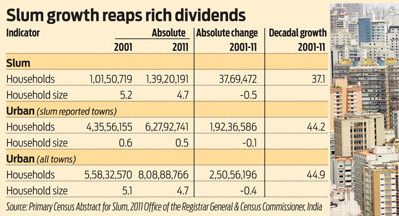R N Bhaskar
March 3, 2014
The Maharashtra government has just tabled a bill to change the cutoff date for recognising slums – from 1995 to 2000. This is against a Bombay High Court order, which was challenged by the state, and is still under review by the Supreme Court. The decision of the chief minister to go ahead, notwithstanding this situation, is indicative of tremendous political compulsions and the voting clout of slums.
It remains to be seen what the courts decide. After all, legislation which seeks to legalise an illegality is both unfair and even unconstitutional. It also violates the rule that all people are equal before the law.
But the chief minister’s predicament is evident. Elections are round the corner and slums remain a major vote bank to change the fortunes of the people who ‘manage’ slums.
Slum development also spells money. The 12th Five Year Plan (2012-17) documents give you an inkling: “For making India slum free, pilot phase of Rajiv Awas Yojana was launched in 2011. The scheme has a progressive architecture which includes in-situ rehabilitation of slums and legislation to provide property rights to slum dwellers.”
There’s more: “The HPEC (High Powered Expert Committee) has estimated a requirement of about Rs 4.1 lakh crore over the 20 years for the purpose of slum rehabilitation.”
Then take this: “[The] Swarna Jayanti Sahari Rozgaar Yojana (SJSRY) is designed to enable urban poor to get gainful employment. Under this scheme 3,941 towns have been covered and an assistance of Rs 360 crore has been released. Since inception, about 12.3 lakh persons have been imparted training under the scheme.”
Then take the projection: “the total shortage of dwelling units in urban areas in 2012 to be 18.78 million units. The projected slum population in India is 94.98 million in 2012.”
But slum population will continue to grow, despite the pious objectives of the Rajiv Awas Yojana. After all, didn’t the Census numbers confirm that the number of households in slums swelled by 37% (25% in actual headcount) between 2001 and 2011? And this is despite four territories – Manipur, Daman & Diu, Dadra & Nagar Haveli and Lakshadweep – not reporting data on slums (against 9 territories in the earlier census).
The fact is that slums spell money – in three ways.
First, through the official largesse outlined in the quotes above.
Then come the daily/weekly/monthly ‘tax-free’ rentals that slum-lords collect from each hutment dweller, which are reportedly shared with the police, the municipal officers and the elected representatives. They provide the daily grease which makes politics the lucrative business it is.
Third comes the jackpot. To engineer an electoral win, a good way is to become a protector of a large group of people and engineer slums; thus becoming a slum-lord. The slum-lord settles the share of the estimated future spoils — with the municipal authorities (for squatting on public land) and the police – and plans ahead. He nurtures his vote-bank, which is financed by the slum-dwellers themselves through protection money. Slum-dwellers marginalise local populations and make all talk of power to the local community meaningless.
One way to stop this is to get the election commission to issue an order that slum-dwellers can exercise their vote only from their original place of dwelling, till they have legal rights to the new place of dwelling. That would ensure that the slum-dwellers’ franchise is not taken away, and that demographic tinkering does not marginalise the votes of existing dwellers. Such an order would weaken the relevance of slumlords as well.
Dovetail this with affordable housing schemes, and states can actually tackle the problem of slums.
However, it would need a savvy election commissioner to create the legal documentation to justify such a move, and which would stand muster before the courts.
Till then, expect slums to grow. Expect more slum rehabilitation schemes to prosper. And, be prepared to pay for them through your taxes.
Caveat – slum formation is bad, but slum dwellers are not.
Click here to read the original article.






































COMMENTS